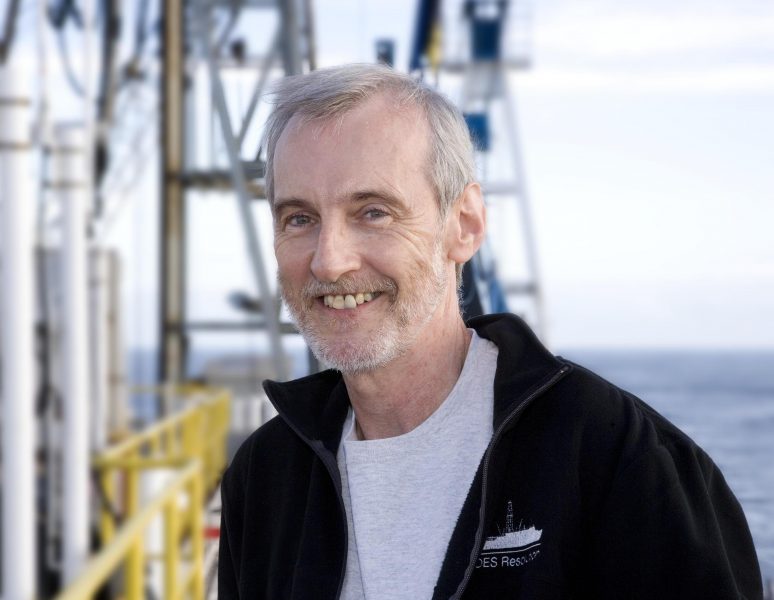Craig Fulthorpe: Retired Senior Research Scientist
December 5, 2022
Craig Fulthorpe was born and raised in Newcastle in northern England, nearly 300 miles from bustling London and, in his mind, a world away from everything. His father was a factory worker and his mother worked office jobs all her life, but Fulthorpe knew that way of life wasn’t for him. He wanted to see the world.
“I always thought the important stuff was happening somewhere else,” he said. “I didn’t want to miss out.”
That’s why, after graduating from the University of Leeds with a bachelor’s degree in civil engineering and working at an engineering firm in Newcastle for a couple of years, he left the United Kingdom and started his new life in the United States.
At first it was Chicago, where he earned a master’s degree in geotechnical engineering at Northwestern University. And then, while working on his doctoral degree in geological sciences, he got a call that would set him on a lifetime of adventuring.
A member of an upcoming trip aboard a research ship had dropped out and they were looking for a replacement. Fulthorpe leapt at the opportunity, joining Ocean Drilling Program Leg 101, a six-week research cruise through the Bahamas. It would be the first of 17 voyages, several lasting
as long as two months and taking him to the waters off New Jersey, California, New Zealand and Australia.
“When I look back, it’s pretty remarkable that any of this actually happened,” said Fulthorpe, who retired in August 2021 after 31 years at the University of Texas Institute for Geophysics.
Fulthorpe focused his research on continental margins, the region where continental crust extends beneath the ocean to abut oceanic crust. Those regions are tantalizing for geologists because they provide relatively easy access to a sedimentary record that’s built up over millions of years, what Fulthorpe describes as “an archive of geological history.”
That gave Fulthorpe a view of the ups and downs of sea level and led to some unexpected finds. While working on the eastern margin of the South Island of New Zealand, he
observed massive, buried, U-shaped troughs in the margin that he realized were created not by variations in sea level, but by strong currents flowing through the Pacific Ocean.
That discovery altered the way geologists viewed the margin, but Fulthorpe downplayed the revelation, saying his body of research was more about continuing to fill in the sedimentary record to help the scientific community better comprehend
what’s happening now and what may occur in the future. “You have to understand the whole history to realize which
bits are relevant today,” he said.
In his later years, Fulthorpe joined the Jackson School’s Gulf of Mexico Basin Depositional Synthesis (GBDS) project, a comprehensive, industry-supported attempt to map the entire
basin to better understand its history and depositional systems. Fulthorpe reveled in one last opportunity to explore a new corner of the world.
Jamie Austin, a senior research scientist at UTIG, was the
co-chief scientist aboard Fulthorpe’s first cruise in the Bahamas and later recruited him to The University of Texas at Austin.
Austin described his colleague as a hard-working scientist and a great shipmate.
“Craig is incredibly diligent, reliable, a good teacher and a great person,” Austin said. “It has been an honor to work with him.”
Fulthorpe made the decision to retire in 2021 shortly after his younger brother James died from ALS, also known as Lou Gehrig’s disease. The younger Fulthorpe had also left their hometown of Newcastle and became a successful engineer. But he never got the chance to sit back and enjoy his accomplishments.
“He never got to retire,” Fulthorpe said. “It just made me take stock.”
Fulthorpe said retirement has been busy as he and his wife, Marjorie Mulanax, sort through a lifetime of work files and mementos. Mulanax also retired last year after 27 years as the executive director of Hospice Austin, so they’re still figuring out their next chapter.
They know they’ll spend more time visiting their two daughters, both University of Texas at Austin alumnae who now live in San Francisco and Boston. And Fulthorpe said he wants to see more of Europe.
But one thing is clear: His seafaring days are behind him. Fulthorpe sheepishly admits that he always struggled with sea sickness, taking a prescription-level anti-nausea medication before and during each voyage. Taking a recreational cruise or sailing the high seas is not in his future.
“I don’t really have much of a desire for a vacation at sea,” he said.
Back to the Newsletter

